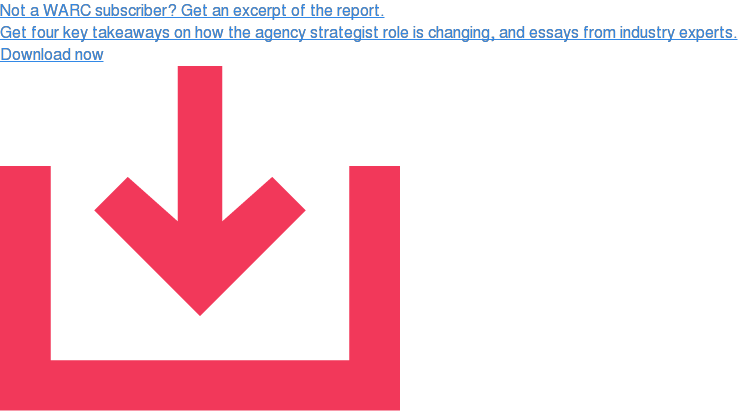This commentary appears in WARC’s new ‘Future of Strategy’ report, based on a global survey of senior agency planners. The report covers the current state of the strategic discipline, future opportunities and challenges, and guidance on building the planning team of the future.
It’s ironic that the most effectiveness-minded discipline pays little attention to whether it creates a commercial return for its employer.
Maybe this isn’t surprising given that historically Planning was given away for free (along with most of the agency) in the days of media commission. It’s also a discipline whose value appears in the creative/tech product; strategy is just harder to see.
Why does this matter?
Look at the results of WARC’s Future of Strategy survey. Globally, 67% of respondents cited client cost-cutting (and short-termism) as the biggest obstacle to Planners in the future. Here’s some representative quotes that will be a familiar story for many:
- “When cost savings are needed, planning gets diluted.”
- “For the bigger clients, they are trying to procure their way out of paying for strategy,”
- “For some clients, planning is one of the first things they cut.”
The Planning industry needs to worry about getting paid.
Clients still have money for agencies, of course (unhelpfully described as ‘non-working budget’,) however, they are being more ruthless about only spending it on the things they value.
So is Planning one of the things that clients value?
WARC’s research found that 61% of respondents felt Planning is having more influence within agencies. So far so good. And yet, a much smaller figure, 46%, said Planning was gaining influence among clients (the ones who pay for it.) And that figure was just 39% in the Americas (Planning’s biggest market). And, remember, the scores are inflated because it is a survey of Planners rating their own worth!
I have no doubt that clients need Planners’ skills more in our complex world: they interpret change and data, envision brand futures, and inspire great content and experiences. But, as a Planner, I too am biased.
Is the value of this contribution obvious enough to clients? Do clients believe Planning is worth investing in vs other competing skillsets that clients need to buy from their suppliers? The WARC research strongly hints that we have a problem.
As I see it, agencies have three ways to respond.
- Make Planning more efficient. Do more, for less. Get its work done more quickly. Prioritise its high value contributions. Make it skim, with impact, across multiple client projects. This is probably the realists’ option. Sweat the Planning assets.
- Invest. Make Planning a fundamental part of the agency offering whether it’s paid for by clients or not. Take the short-term margin hit for a belief in longer term agency strength. From this point of view, Planning is ‘non-profit’; the purists’ option, but commercially challenging.
- Grow – or at least defend - their client fees for Planning. Obviously, there are new specialist strategy services to sell, from analytics to UX to social media. But creating organic growth in Planning’s heartland contribution is key. This is the confident route forward. But tough.
Stop giving Planning away for free. Every time any agency breaks ranks and throws some strategy hours in for nothing, then we all suffer. Planning matters and all agencies – creative, media, digital – need to hold their nerve.
What is obviously key is for Planning to add tremendous value to a client’s business. That requires knowing what ‘value’ means for any client, but invariably it will be tackling the bigger issues, not the smaller ones. It will mean providing faster and higher quality solutions to those issues than the client could have created on their own.
Equally important but less obvious is the need for Planning to be seen to add that value. Make the strategic contribution visible. Take the time to present and explain your strategic thinking to clients. Dramatise the choices you made and highlight how they make a difference to the final outcome. Just like at school, you get marks for showing your ‘workings out’. And, of course, measure, measure, measure to show you were right.
Planning’s future value will depend upon its ability to show that Planning matters.


